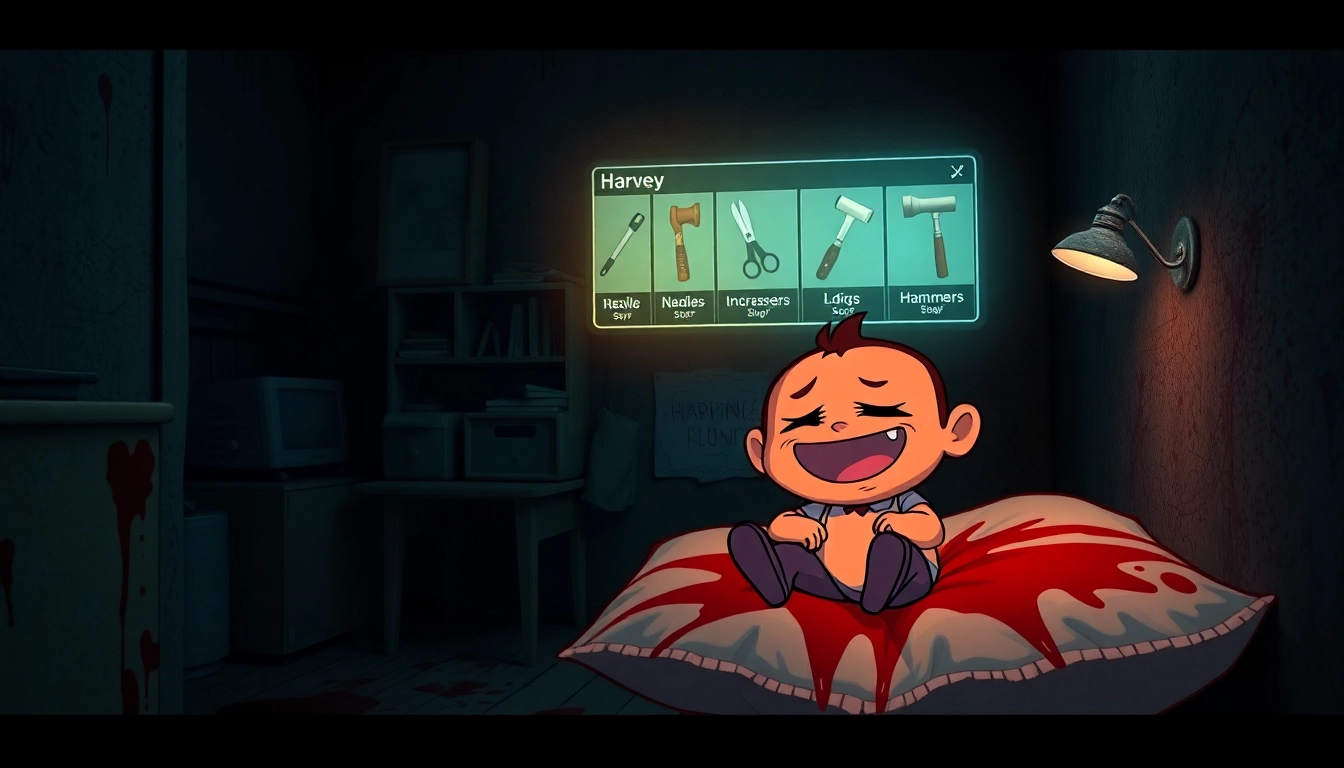Overview and Context: BloodMoney – A Psychological Horror Clicker Experience
In the realm of indie psychological horror games, few titles manage to evoke such intense emotional and moral reactions as blood money. This dark, disturbing clicker game plunges players into a morally complex universe where every action, every click, has profound consequences. Designed by SHROOMYCHRIST, BloodMoney offers a visceral experience that challenges players to confront their own ethics amid a desperate fight for survival. Whether you’re a fan of psychological horror, dark storytelling, or simply seeking an intense moral test, BloodMoney stands out as a unique and thought-provoking title that pushes the boundaries of interactive storytelling.
Game Mechanics and Core Gameplay
Clicking for Profit: The Foundation of BloodMoney
At the core of BloodMoney lies a deceptively simple mechanic: clicking on Harvey, a cheerful and seemingly innocent character, generates money. The player’s goal is to accumulate $25,000—an urgent sum needed to cover medical bills for a life-threatening condition. Each click is an act of desperation, a symbol of the lengths one is willing to go for survival. Initially, the process appears straightforward: click, earn, repeat. But as the game progresses, this mechanic evolves into a harrowing moral dilemma. The more you click, the more Harvey suffers, and the more unsettling the visuals become.
Upgrade System and Increasing Violence
As players advance, they gain access to an in-game shop offering upgrades to maximize earnings. These upgrades range from innocuous tools like pillows to increasingly violent weapons such as scissors, needles, and hammers. Each purchase enhances Harvey’s suffering but also significantly boosts the amount of money earned per click. This creates a twisted risk-reward dynamic: do you choose the least harmful path, or do you push for maximum profit regardless of Harvey’s pain? The game’s upgrade system is a reflection of moral compromise, forcing players to weigh their ethics against their survival instincts.
The Dark Narrative of BloodMoney and Harvey
Harvey’s Role and Changing Expressions
Harvey is presented as a cheerful, innocent character who, despite his apparent naivety, becomes a mirror for the player’s moral descent. As the game progresses, subtle visual cues reveal Harvey’s increasing pain and fear—his expressions shift from cheerful to distressed, and his reactions grow more visceral. Observant players have noted that Harvey seems genuinely surprised by the violent tools, implying he may not fully understand what he’s being subjected to. This adds a haunting layer of innocence caught in a corrupt system, prompting players to consider their own moral boundaries.
The Player’s Ethical Choices and Consequences
BloodMoney’s narrative is deeply rooted in moral ambiguity. Players are faced with choices that range from minimal harm to outright violence. Do you choose the path of least suffering, risking failure to reach your financial goal? Or do you push for maximum efficiency, even if it means Harvey endures extreme pain? These decisions influence the story’s outcome, leading to one of three endings: the Good Ending, the Normal Ending, or the Bad Ending. The game’s storytelling masterfully explores themes of human morality, desperation, and the duality of human nature.
Visual and Emotional Impact
Subtle Cues and Atmosphere
BloodMoney excels at creating an oppressive, unsettling atmosphere through subtle visual cues and dialogue. Harvey’s changing expressions, along with increasingly disturbing visuals as upgrades become more violent, serve to heighten the emotional tension. The game’s minimalistic art style contrasts sharply with the grotesque content, making each visual shift even more jarring. The atmosphere is designed to evoke discomfort, forcing players to confront the psychological toll of their choices.
Player Reactions and Psychological Effects
Many players report experiencing genuine emotional reactions while playing BloodMoney. Scenes where Harvey reacts to pain—such as flinching at a needle or trembling with fear—are so convincingly portrayed that they evoke feelings of guilt and empathy. The game’s emotional design pushes players to question not only their in-game morality but also how similar moral compromises manifest in real life. The visceral experience can lead to moments of introspection, guilt, and even moral debate among players.
Multiple Endings and Moral Outcomes
The Good Ending: Compassion Over Profit
Achieved by choosing options that minimize Harvey’s suffering, the Good Ending reflects a moral stance prioritizing compassion and ethical integrity. Here, players forgo the most violent upgrades, opting instead for less harmful tools like scissors or even avoiding upgrades altogether. While this pathway may slow progress towards the financial goal, it offers a sense of moral victory, emphasizing the importance of empathy even in dire circumstances.
The Normal Ending: Balanced Approach
The Normal Ending is accessible through a mixture of moderate upgrades—perhaps utilizing scissors or the needle—balancing profit and suffering. This route suggests a compromise: players are willing to cause some pain but avoid the most brutal tools. It highlights the internal conflict between self-preservation and moral conscience, leaving players with a nuanced reflection on their choices.
The Bad Ending: Maximal Efficiency, Maximal Suffering
The Bad Ending is unlocked when players prioritize profit above all else, adopting violent tools like the hammer or knife. Harvey endures maximum pain, and the visuals become increasingly disturbing. This path symbolizes moral decay, where the player’s relentless pursuit of survival disregards human suffering. The ending serves as a stark warning about the consequences of unchecked greed and moral abandonment.
Community Insights and Player Experiences
Discussions on Morality and Human Nature
BloodMoney has sparked vibrant discussions within gaming communities about morality, human nature, and the psychology of desperation. Many players share their experiences, noting how the game’s subtle cues and choices influence their perception of right and wrong. Some emphasize how the game acts as a mirror to real-world dilemmas—raising questions about what compromises are acceptable when life is at stake.
Hidden Depths and Replayability
Beyond its grim surface, BloodMoney offers hidden depths that reward multiple playthroughs. For instance, some players have discovered that even with violent tools, it’s possible to unlock the Good Ending by making specific moral choices. The game tracks subtle behaviors and decisions, encouraging experimentation. This replayability fosters ongoing reflection on morality and the consequences of one’s actions, making BloodMoney more than just a shock experience—it’s a profound moral exploration.
Reflection: Morality in Gaming and Real-Life Parallels
BloodMoney pushes players to confront uncomfortable truths about human nature and morality. It challenges us to consider how desperation influences our choices and whether morality is absolute or contextual. The game’s design emphasizes that even within a fictional universe, the questions it raises are deeply relevant to real-life ethical debates—about survival, compassion, and the cost of greed.
Conclusion: How BloodMoney Challenges Our Moral Boundaries
In the end, BloodMoney is more than a dark clicker game; it’s a psychological experiment on morality and human resilience. Every click, every upgrade, becomes a metaphor for moral compromise, forcing players to ask themselves: How far are you willing to go when your life depends on it? The game’s multiple endings, subtle visual cues, and emotionally charged narrative make it an unforgettable experience that lingers long after the screen goes dark. It masterfully tests the boundaries of human conscience, revealing both the darkness and the potential for empathy within us all.
Related Games and Further Exploration
BloodMoney exists within a broader landscape of psychological horror and morality-based games. Fans interested in exploring similar themes might consider titles like “Don’t Forget” or other narrative-driven experiences that challenge perceptions of right and wrong. These games, like BloodMoney, aim to evoke emotional responses and provoke deep reflection on human nature.
Connect With Us and Stay Updated
For those intrigued by BloodMoney and eager to delve deeper into its dark universe, stay connected with us for updates, gameplay insights, and community discussions. This game is a fan-made project for educational purposes, created by SHROOMYCHRIST, and offers a haunting exploration of morality in the digital age. Discover how far you’re willing to go for survival, and remember—every decision shapes your story.
To experience this unsettling journey firsthand, visit blood money. How will your choices define your fate? The dark moral dilemma awaits.




